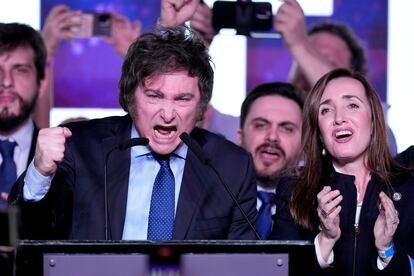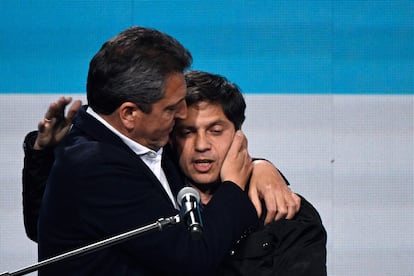Ultra-conservative Javier Milei capitalizes on the protest vote and wins Argentina’s primaries
The anti-abortion economist, who wants to abolish the state, gets 30% while the traditional right wing coalition comes second, just one point ahead of the ruling Peronist party

Argentina’s traditional political structure was rocked when voters opted overwhelmingly in the primaries for Javier Milei, a candidate capitalizing on the anger that’s built up on the back of years of socio-economic deterioration. The ultra-liberal economist, who declares himself an “anarcho-capitalist,” is against abortion, considers climate change “a ruse” invented by the left, advocates the end of the state and identifies with Spain’s ultra-right party, Vox. With more than 96% of the votes counted, he obtained 30.1%, followed by Peronist Sergio Massa, with 20.9% and the center-right Republican Proposal’s Patricia Bullrich, a member of the opposition coalition Together for Change, with almost 17%. The sum of votes between Bullrich and another Together for Change candidate, Horacio Rodríguez Larreta, reached 28.3%, more than two points behind Milei. With its worst result in the primaries since 2011, Peronism came third, with 27.2%.
The August 13 primaries painted a three-party scenario, a novelty in a country dominated for years by two main coalitions: one led by Peronists and the other by the right wing, created by former president Mauricio Macri. Promising the end of the political elite, Milei’s gains have, however, changed the political landscape.

More than 35 million Argentines were asked to vote in these primaries in which the winners will compete for the presidency on October 22 with a possible second round on November 19.
The results may have unpredictable consequences for the South American country which will now be embroiled in a tough electoral campaign in the final stretch of a Peronist government that has not been able to tame inflation, now at an annual 115.6% having doubled in the last four years. The poor election results for the ruling party further weakens President Alberto Fernández’s government and complicates Sergio Massa’s job as Minister of Economy and presidential candidate.
As soon as the first results emerged, Milei’s supporters celebrated as if it were the definitive election with shouts of “President, Milei president!” At the end of the night, the winner jumped onto the stage calmly. A child of no more than 10 called out, “Milei, I love you!” and the economist shouted “Long live freedom!” three times. “We are the true opposition,” he said. “A different Argentina is impossible with the same set-up as always — with those who have been failing forever. We are an alternative that will not only put an end to Kirchnerism, but also to the whole parasitic political class that has ruined this country.”
According to Argentine electoral laws, Milei will need to win 45% of the votes or 40% with a difference of 10 points over the immediate runner-up to win in the first round of the general elections on October 22. In these primaries, his party, La Libertad Avanza, got around 30%.
Despite how far they still have to go to get into power, the triumphant mood of Milei’s supporters prevailed as they gathered outside the Hotel Libertador from 6 p.m. “It is a historic moment for all of us — unthinkable,” said Milei’s running mate, Victoria Villarruel, famous for vindicating Argentina’s last dictatorship. “There are extremely high numbers for La Libertad Avanza. We demand that they report these figures and keep their word.” Meanwhile, outside, hundreds chanted “the elite is afraid!” — Milei’s war cry against politicians.

A sharp shift to the right
The candidacies of Milei and Bullrich represent a sharp shift to the right in Argentina. They also mean the failure of the strategy of dialogue advocated by Rodríguez Larreta, mayor of Buenos Aires and Bullrich’s rival, in the face of the hard-line policies and cuts in social spending anticipated by both Milei and Bullrich.
Milei wants to ban abortion, made legal in the country in 2020. He also advocates the right to bear firearms and believes that the sale of organs is just “another market.” He is also in favor of closing the Ministries of Education and Social Development and “burning” the central bank, a step prior to what would be a dollarization of the economy to end inflation. Meanwhile, Bullrich, former security minister in Mauricio Macri’s government (2015-2017), promises to toughen laws against crime and put an end to street and road blockades as a form of protest. In economic policy, she says that a government under her would receive enough dollars from abroad to put the economy back on track.
The pair coincide on a number of issues. Bullrich congratulated Milei “for the enormous election gains he made” and highlighted the common desire for the state not to be a Cámpora’s cave in reference to the Kirchnerist group created by politician Máximo Kirchner, son of former presidents Néstor and Cristina Kirchner. “It does not exist anymore, Kirchnerism does not exist anymore,” said the supporters of Together for Change, who also chanted “President Patricia!”
The message is a harsh one for the ruling Peronist party, but also for Bullrich’s coalition. Millions of voters have turned their backs on traditional parties and are backing an outsider who wants to kick “politicians out on their asses.”
Milei has won in important provinces that have a tradition of voting for the opposition, such as Córdoba and Santa Fe, the second and third most populated in the country, but also in Peronist fiefdoms in the north, such as Tucumán, Salta, La Rioja and San Juan, as well as in the Patagonian Santa Cruz region, the cradle of Kirchnerism.
The disenchantment of those who voted for Fernández four years ago explains the worst defeat of Peronism in a primary since 2011. If the result is repeated in the general elections, it will be the worst for a serving president since the country’s return to democracy in 1983. Fernández’s voters were confident he would get the country out of the economic crisis after Macri’s government, which left power in 2019 with 50% inflation. But the economic situation has only worsened since then.
Fernández has failed to reduce poverty rates despite improving employment. But Peronist presidential candidate Sergio Massa remains optimistic. “This is the end of the first half. We still have the second half. We will be fighting until the last minute,” he told his supporters. Neither the president, Alberto Fernández, nor the vice-president, Cristina Kirchner, were with him as he spoke.

Buenos Aires, the Peronist refuge
The great hope of the ruling party lies in the hands of the Buenos Aires provincial governor, Kirchnerist Axel Kicillof, who is running for reelection. He won 36.4% of the vote, winning the country’s biggest province.
Together for Change will, however, keep its fiefdom: the city of Buenos Aires. One out of two voters chose the coalition. The internal election was won by the former president’s cousin Jorge Macri, who appears to be paving the way to become the next mayor of the Argentine capital.
But the night belonged to Milei. After midnight, he danced along with his supporters to Se viene, one of Argentina’s greatest hits, written as a protest song against the neo-liberal government of Carlos Menem. “The crash is coming,” says the song. Milei views Menem as his hero; the band, Bersuit Vergarabat, has forbidden Milei to use the song in his rallies. But the libertarian has, again, disobeyed.
Sign up for our weekly newsletter to get more English-language news coverage from EL PAÍS USA Edition
Tu suscripción se está usando en otro dispositivo
¿Quieres añadir otro usuario a tu suscripción?
Si continúas leyendo en este dispositivo, no se podrá leer en el otro.
FlechaTu suscripción se está usando en otro dispositivo y solo puedes acceder a EL PAÍS desde un dispositivo a la vez.
Si quieres compartir tu cuenta, cambia tu suscripción a la modalidad Premium, así podrás añadir otro usuario. Cada uno accederá con su propia cuenta de email, lo que os permitirá personalizar vuestra experiencia en EL PAÍS.
¿Tienes una suscripción de empresa? Accede aquí para contratar más cuentas.
En el caso de no saber quién está usando tu cuenta, te recomendamos cambiar tu contraseña aquí.
Si decides continuar compartiendo tu cuenta, este mensaje se mostrará en tu dispositivo y en el de la otra persona que está usando tu cuenta de forma indefinida, afectando a tu experiencia de lectura. Puedes consultar aquí los términos y condiciones de la suscripción digital.








































